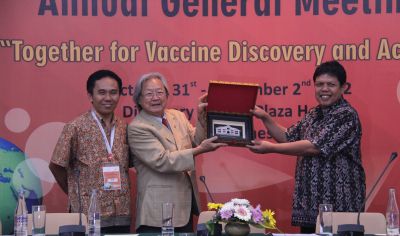|
| Friday, 2 November 2012, 17:30 HKT/SGT | |
| |  | |
Source: DCVMN | |
|
|
|
|
| Through Establishing Greater Cooperation throughout the Developing World on Vaccine Research and Development |
Nusa Dua Bali, Indonesia, Nov 2, 2012 - (ACN Newswire) - The Developing Countries Vaccine Manufacturers Network (DCVMN) can become stronger, especially in establishing cooperation on vaccine research and development.
 | | 13th DCVMN Conference: DCVMN Must Become Stronger |
"DCVMN can be stronger. We have to increase vaccine availability and to improve the quality of vaccine production in developing countries," said out-going DCVMN President Akira Homma at the closing ceremony of 13th DCVMN Annual General Meeting in Kuta Bali today.
Homma said DCVMN countries have committed to increasing their efforts to develop vaccines to prevent millions of deaths caused by infectious disease. Therefore the network members must share the technology and know-how to develop the capacity to produce over 40 vaccine types that would contribute to preventing 2,5 million deaths each year, as estimated by WHO.
Homma also said that Bio Farma is an example of a successful vaccine maker in the developing world not only for being able to produce various types vaccines prequalified by the WHO, but for its initiatives and cooperation on vaccine research with many developing countries as well.
Homma, of Brazil's Bio-Manguinhos-Fiocruz vaccine manufacturer, pointed out the leading role Bio Farma had taken up in 1999 when WHO sponsored steps for the developing countries to jointly develop their capabilities in vaccine research and making.
Homma added that today the largest amount of vaccines bought by WHO are produced in the developing countries as they are of the same high quality as those produced in the industrialized world, with lower prices.
The newly-elected president of the DCVMN, Mahendra Suhardono of Bio Farma, expressed his optimism that the organization could be better and become stronger, especially under his leadership for the next two years.
"We commit to increasing cooperation and technology transfer in order to increase vaccine production among developing countries in large quantities and at affordable prices. We don't only want to be sustainable, but we commit to delivering vaccines to more people as well," said Mahendra Suhardono.
Mahendra also stated that Bio Farma has offered cooperation to other developing countries. Two countries which have developed cooperation with Bio Farma are India and South Africa. So far Bio Farma has produced eleven types of vaccine, all WHO pre-qualified.
According to Mahendra, Indonesia has already achieved a "sound, technological platform" in vaccine production and therefore looks forward to establishing cooperation in vaccine research and developments with other DCVMN member countries.
The 13th DCVMN Annual General Meeting in Kuta Bali was attended by more than 100 vaccine experts and high ranking health officials from DCVMN member states and other countries as well as UN bodies. The meeting also feature presentations and discussions from vaccine experts and government officials from the United States, Europe, Latin America and U.N. bodies.
The 14th DCVMN Annual General Meeting will be held next year in Vietnam.
Contact:
Aat Surya Safaat
General Manager, Corporate Business Development
Perum LKBN ANTARA - Indonesian News Agency
T: +62-21-3802-2383 ext 251
M: +62-811-225-2228
E: aat@antara.co.id
U: www.antaranews.com
Topic: Trade Show or Conference
Source: DCVMN
Sectors: BioTech
http://www.acnnewswire.com
From the Asia Corporate News Network
Copyright © 2026 ACN Newswire. All rights reserved. A division of Asia Corporate News Network.
|
|
|

|